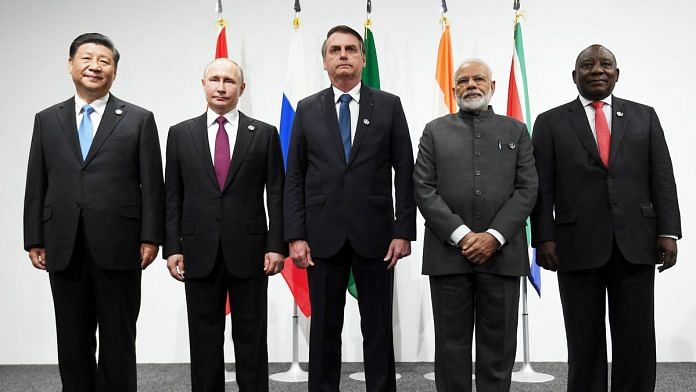New Delhi: The 11th BRICS Summit is set to begin in Brazil Wednesday, but the two-day event is unlikely to achieve much as it comes amid economic slowdown in all the five member countries — Brazil, Russia, India, China and South Africa.
The agenda for the BRICS Summit this year is fairly extensive, including climate change and counter-terrorism measures, among others.
However, in the absence of anything concrete on trade and investments, the event is expected to turn out to be yet another “damp squib”, like it has been in the last few years, sources told ThePrint.
At the moment, each of the BRICS member nations are facing a sluggish economy — fall in exports and rise in unemployment — with pressure from domestic constituencies on populist leaders to boost growth.
Economic crisis
Two of the largest economies in the grouping, China and India, are grappling with the issue of falling exports.
In the middle of a raging trade war with the US, China has seen a rapid drop in exports. In September, shipments from China fell 3.2 per cent from a year ago, the biggest fall since February. In the September quarter, its gross domestic product (GDP) was at 6 per cent, the slowest pace of growth since 1992.
India is struggling similarly to propel merchandise exports. During the April-September period this fiscal, exports were down 2.39 per cent to $159.57 billion. In the June quarter, India’s GDP fell to a six-year low of 5 per cent.
Moscow, too, witnessed a fall of 4.8 per cent in exports in the first nine months of the calendar year.
With stalling growth, Brazil is contemplating the release of a comprehensive economic package to revive the private sector. Last week, Brazilian Finance Minister Paulo Guedes presented a proposal to the Congress to propel growth that will require constitutional amendments.
The IMF has cut South Africa’s 2019 economic growth forecast by 0.5 percentage points, from 1.2 per cent forecast in April to 0.7 per cent.
Also read: BRICS is all about geopolitics, not economics
‘Relevance of BRICS could diminish’
Speaking to ThePrint, Amarendra Khatua, former secretary at the Ministry of External Affairs (MEA), said, “If these countries discuss economic cooperation between themselves, which can include a potential BRICS trade and investment agreement, then it makes some sense. Else, the relevance of BRICS will gradually diminish.
“Each of these countries have to address the domestic economic challenges they are facing, which they cannot ignore,” said Khatua.
In 2014, the BRICS members founded the New Development Bank (NDB) to fund public and private projects, but it has not been able to lend for any mega project.
T.S. Tirumurti, Secretary (Economic Relations), MEA, said the bank has probably now lent more than $12 billion and is now looking to finance projects in the field of clean and renewable energy.
The initial authorised capital of the bank was $100 billion.
Apart from the NDB, the BRICS grouping hasn’t been able to achieve anything significant on the economic front in the last few years.
Elephants in the room – India and China
The 11th BRICS summit comes close on the heels of India walking out of the ASEAN-led mega free trade pact Regional Comprehensive Economic Partnership (RCEP), fearing preferential access to Chinese goods to enter Indian markets.
As a result, the inevitable tensions between India and China, especially over trade and investment issues, are expected to impact the meeting of BRICS leaders, sources told ThePrint.
There are chances that Prime Minister Narendra Modi and Chinese President Xi Jinping might have a bilateral dialogue separately. However, no big-ticket announcement is expected to come out of the summit, added the sources.
“The BRICS will not be able to discuss trade that much after India’s decision to say no to RCEP. Maybe there will be some announcement on people-to-people exchanges and culture. Besides, the new government in Brazil is not much keen on BRICS,” said Pinak R. Chakravarty, former secretary (economic relations).
Prime Minister Narendra Modi will be traveling to Brasilia to attend the meet on 13-14 November. This will be his sixth BRICS Summit, which was last held in South Africa.
During the trip, Modi is also expected to extend a formal invitation to Brazilian President Jair Bolsonaro to be the chief guest at the 2020 Republic Day celebrations.
Also read: India drops 10 places on global competitive index, among the worst BRICS nations




BRICS may not be as irrelevant as NAM, but it was little more than a passing fad, comprehensively deflated by the 2008 GFC. 2. Relations between India and China are chilling. A recent investment summit has been called off. The Indian economy continues to disappoint. The decision to stay away from RCEP will dim the glow further. 3. Bilateral meetings five or six times a year can become ritualistic.